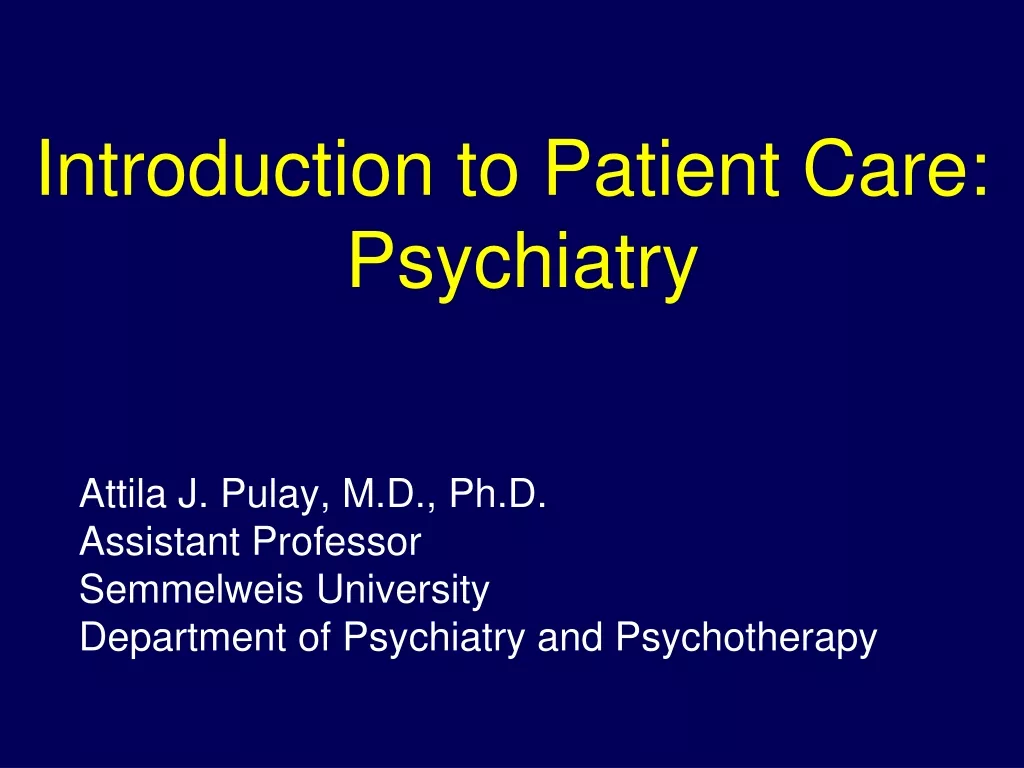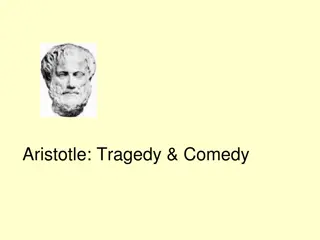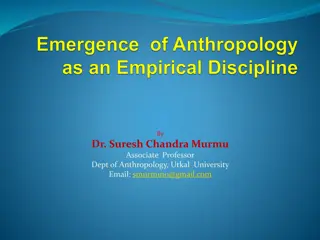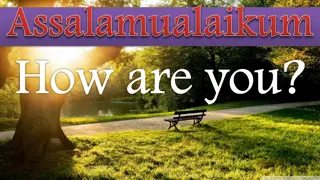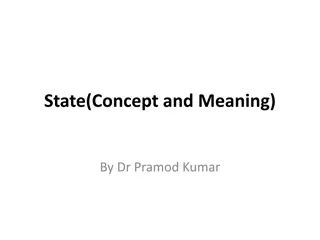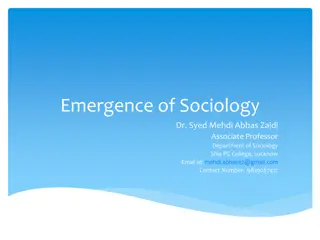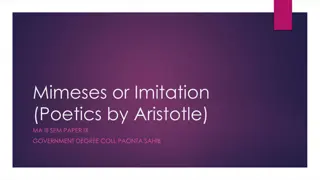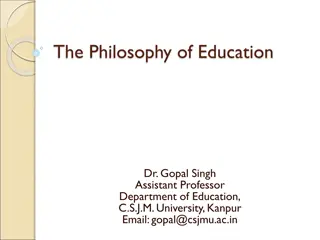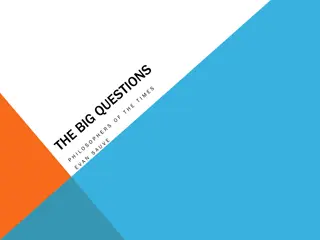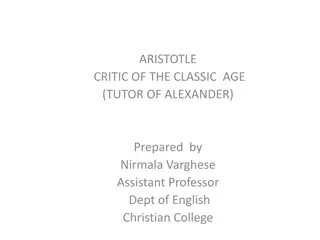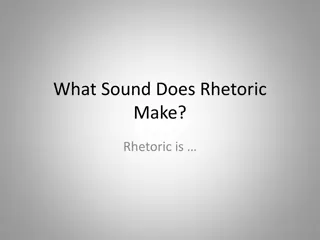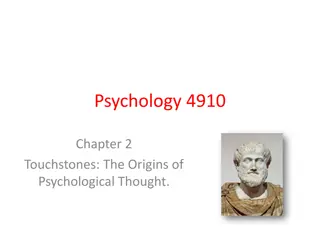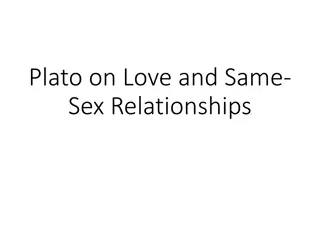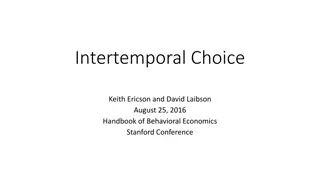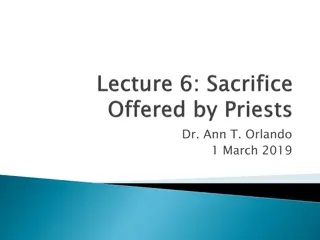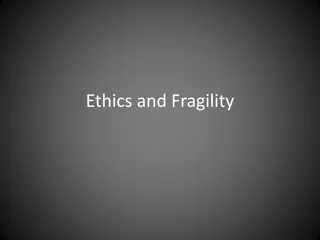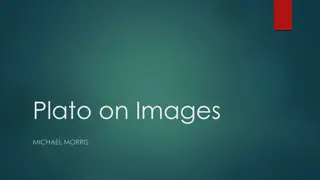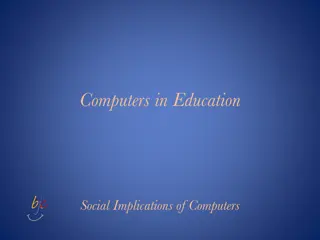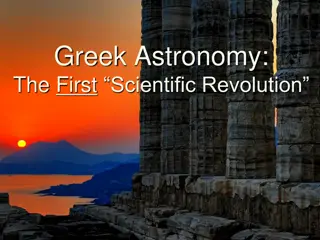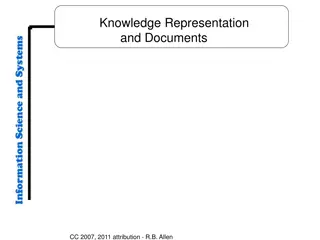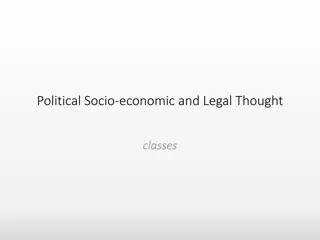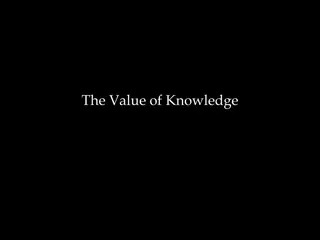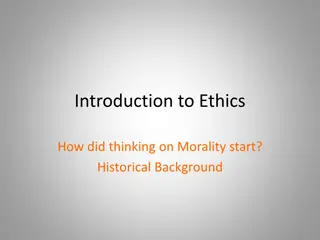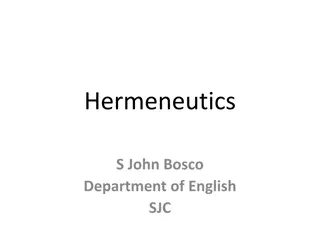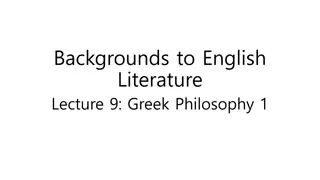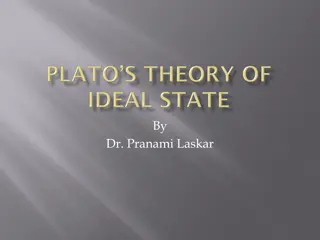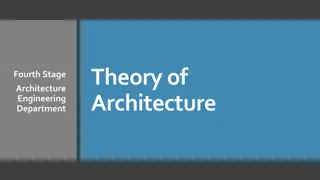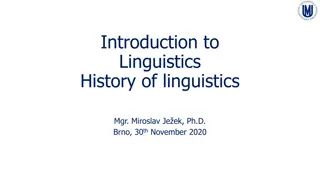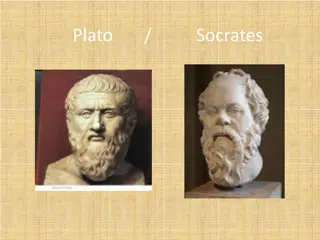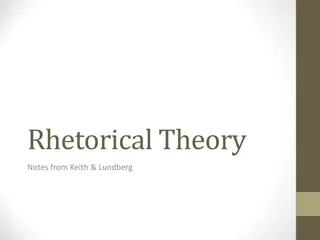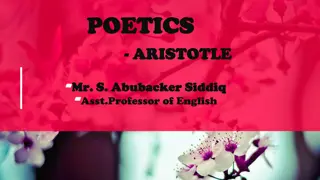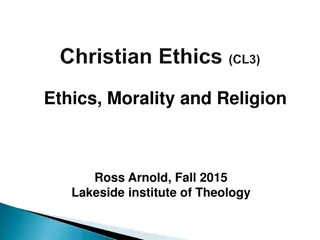Evolution of Psychiatry: A Historical Journey through Time
Psychiatry, a field blending clinical practice, biology, and social sciences, has ancient roots dating back to Graeco-Roman philosophers like Plato and Hippocrates. Significant historical milestones include the body humor hypothesis, the first mental health ward, and the emergence of psychiatric asy
2 views • 49 slides
Aristotle's The Poetics: Tragedy and Comedy Analysis
Aristotle, the Greek philosopher, introduced key concepts in his work The Poetics, focusing on tragedy and comedy. He countered Plato's views on literature and emphasized the importance of imitation, catharsis, and the unity of time, place, and action in dramatic composition.
0 views • 32 slides
Evolution of Anthropology: From Herodotus to Modern Times
Anthropology has evolved over centuries, with roots tracing back to ancient Greeks like Herodotus. The discipline developed into a scientific field during the European Enlightenment and has since progressed to study the science of humanity and cultural differences. Philosophers like Plato and Aristo
2 views • 40 slides
Stories of Honesty and Wisdom from History
Discover tales of honesty and wisdom in historical settings through rearranging sentences to create coherent stories. Explore the accounts of an honest tax collector appointed by a Sultan and the intellectual journey of the renowned philosopher Aristotle under the mentorship of Plato.
0 views • 20 slides
Understanding the Concept of the State by Dr. Pramod Kumar
The concept of the State is central to traditional political theory, with varying significance in modern political thought. It encompasses the idea of a community with legitimate authority over a territory. Various definitions by scholars like Sidgwick, Garner, and Laski highlight the key elements o
0 views • 17 slides
The Emergence of Sociology: A Historical Overview
Sociology, derived from Latin and Greek roots, has evolved over centuries through various stages, influenced by social, economic, and political factors. Key thinkers like Plato, Aristotle, Hobbes, Locke, Rousseau, Montesquieu, Comte, Durkheim, and Marx have shaped the discipline. The Industrial Revo
1 views • 23 slides
The Theory of Mimesis in Aristotle's Poetics
Aristotle's theory of mimesis, outlined in his work "Poetics," contrasts with Plato's view by emphasizing that art imitates nature. He believes that poetry expresses the universal while history narrates the particular, highlighting the poet's freedom from factual constraints to explore larger truths
0 views • 12 slides
The Art of Rhetoric and Persuasion: A Journey from Greece
The history of rhetoric and the concepts of persuasion trace back to ancient Greece with prominent figures like Aristotle and Plato. Aristotle's book, "The Art of Rhetoric," introduced the three methods of persuasion - Pathos, Logos, and Ethos. Pathos appeals to emotions, Logos involves logic and re
0 views • 25 slides
Understanding the Social Institution of Education
Education is a vital social institution that goes beyond knowledge impartation, encompassing the development of habits and attitudes to navigate the future successfully. Various perspectives, from Durkheim to Plato, shed light on the purpose and significance of education in shaping individuals and s
0 views • 23 slides
The Life and Contributions of Plato: A Historical Overview
Plato, a Classical Greek philosopher and mathematician, played a significant role in shaping Western philosophy and science. Born around 427 B.C. in Athens, he was influenced by his mentor Socrates and later founded the Academy in Athens. Plato's works such as "The Republic" and "The Laws" are renow
0 views • 45 slides
Exploring the Philosophy of Education with Dr. Gopal Singh
Philosophy of education examines teachers' personal philosophies that influence their teaching methods. Engaging in philosophy helps clarify intentions and justifications logically. Understanding key notions like self-identity and purpose is essential. Philosophical inquiry involves metaphysics, epi
0 views • 25 slides
Influential Philosophers Through Time
Influential philosophers from different periods in history, such as Confucius from ancient China, Socrates and Plato from ancient Greece, Aristotle, Paul of Tarsus, René Descartes, and John Locke. These thinkers contributed groundbreaking ideas to philosophy and society, shaping the way we understa
0 views • 10 slides
Understanding Aristotle's Poetics: A Critique of the Classic Age
Aristotle, a tutor to Alexander the Great, delves into fundamental concepts in his work "Poetics." He challenges Plato's view of imitation, emphasizing creativity. Focusing on Mimesis, Katharsis, Hamartia, and Spoudaios, he explores the essence of art and tragedy, highlighting noble character and tr
0 views • 7 slides
Understanding the Art of Rhetoric
Explore the diverse perspectives on the concept of rhetoric, ranging from Plato and Aristotle to modern thinkers like Henry Ward Beecher and Andrea Lunsford. Rhetoric is depicted as the art of persuasion, with various scholars defining it as enchanting the soul, discovering means of persuasion, or i
1 views • 13 slides
Al-Farabi: Influential Medieval Philosopher and His Ideal City Concept
Al-Farabi, influenced by Plato and Aristotle, was known as the Second Aristotle. His works spanned various fields like logic, math, medicine, music, politics, and ethics. He proposed a philosophy involving God as a beginning, being in the middle, and happiness as the end. Al-Farabi delved into the c
0 views • 5 slides
Origins of Psychological Thought: Ancient Wisdom and Modern Insights
Explore the foundational concepts of psychology by delving into the ancient wisdom of Greek philosophers like Pythagoras and Plato, as well as Eastern perspectives from Lao-tzu and the I Ching. Discover how these early ideas shaped modern psychological thought and the understanding of human behavior
0 views • 14 slides
Exploration of Love and Same-Sex Relationships in Plato's Symposium
Delve into the rich discussions on love and same-sex relationships presented in Plato's Symposium. The text explores various perspectives, including notions of nobility, sexuality, and different types of love, shedding light on societal attitudes and philosophical reflections on these topics.
0 views • 9 slides
Intertemporal Choice and Behavioral Economics Overview
Explore present-focused models, empirical regularities, and open questions related to intertemporal choice in behavioral economics. Concepts like hyperbolic discounting, dual-self models, psychometric distortions, and myopia are discussed using insights from prominent figures like David Hume, Plato,
0 views • 37 slides
Exploring the Depth of Mystery and Sacraments in Christian Liturgy
Delve into the realm of mystery and sacraments in Christian liturgy, from the significance of the Eucharist to the hidden teachings in Plato's philosophy. Discover the roots of mystery cults, the connection of Christ as the mysterion of God, and the practice of thanksgiving prayers in the early Chur
0 views • 15 slides
Luck and Ethics in Greek Thinking: Insights from Martha Nussbaum
Martha Nussbaum delves into Greek ethics, highlighting the concepts of tuche (luck) and techne (skill). She discusses how tuche can disrupt life, leading to the fragility of goodness. Nussbaum argues that Plato aimed to develop techne to counter tuche, aiming to protect life from luck and achieve go
0 views • 20 slides
Plato on Artistic Images: An Interpretation from Republic X
Delve into Plato's theory of artistic images as explored in Republic X. Discover how Plato challenges the notion of photographic realism and presents a deeper understanding of craftsmanship and creation. Gain insights into the essence of art and its connection to metaphysics in this thought-provokin
0 views • 19 slides
The Evolution of Computers in Education: Social Implications Unveiled
Computers have significantly impacted education, from the early days of Plato and BASIC programming to the modern era of MOOCs. They have revolutionized teaching methods, standardized testing, and student learning experiences, leading to both positive advancements and challenges in the education sys
0 views • 7 slides
Gifted Education Insights and Resources
Various images and quotes related to gifted education, featuring Gifted Parent Advisory Council events, district gifted teams, specialists, and educational insights. The content highlights the importance of play in learning, explores major concerns for ESE/gifted students, and emphasizes the role of
0 views • 21 slides
Analysis of Themes in "The Courtier" and Connections to Classical Works
Explore the themes of courtly grace, love, beauty, and human nature in "The Courtier" through connections to classical works such as Plato's "Ladder of Love" and Shakespeare's "Hamlet." Delve into the concept of sprezzatura and the progression towards virtue as seen in Bembo's writings. Consider the
0 views • 25 slides
Greek Astronomy: The First Scientific Revolution - A Visual Journey Through Ancient Greek Astronomy
Explore the world of ancient Greek astronomy through captivating images depicting landmarks, artifacts, and key figures such as Plato, Aristotle, Ptolemy, and Pythagoras. Discover the reasons behind the Greeks' reliance on astronomy, their contributions to science, and their rejection of mythologica
0 views • 52 slides
Understanding Knowledge Representation and Categories in Information Systems
Exploring various types of representations and categories, this content delves into Aristotle's classical view of categories, the contrast between Aristotle's empirical approach and Plato's Ideals, the concept of prototypes, and different models for categorization. It highlights how entities are cla
0 views • 21 slides
Comprehensive Guide to Political, Socio-Economic, and Legal Thought Classes
This comprehensive guide covers topics for essays and presentations in Political, Socio-Economic, and Legal Thought classes. It includes deadlines, presentation subjects, essay requirements, and examples like Plato's ideologies on State, Economy, Law, Bio, Morality, and Society. Students must adhere
0 views • 11 slides
The Value of Knowledge: A Philosophical Exploration
Exploring the value of knowledge through the lens of Plato's Meno Problem, this text delves into why knowledge is considered more valuable than mere true belief. It discusses Plato's solution to the problem, the secondary and tertiary value problems, and constraints on solutions and strategies in un
0 views • 22 slides
Exploring the Origins and Diverse Perspectives on Morality
Explore the historical foundations of morality, from Plato's Ring of Gyges to Cultural Relativism, questioning the basis of ethical behavior and societal norms over time. Delve into philosophical debates that challenge our understanding of right and wrong, highlighting the complexities of moral reas
0 views • 17 slides
Exploring Language, Meaning, and Rational Thought in Cognitive Science
Dive into the intriguing realm of thought processes and inner speech as discussed by prominent scholars such as Plato, John B. Watson, Peter Carruthers, Noam Chomsky, and Ludwig Wittgenstein. Discover varying perspectives on how language intertwines with our conscious thoughts, challenging conventio
0 views • 111 slides
Understanding Hermeneutics: Exploring Interpretation and Meaning
Hermeneutics, a vital part of theology and philosophy, delves into understanding text and interpretation. Influenced by prominent thinkers like Heidegger and Ricoeur, it emphasizes the historical encounter and personal experience within the world. The concept of hermeneutical circle and the two area
0 views • 24 slides
Greek Philosophy: Origins and Influential Thinkers
Greek philosophy originated with the Pre-Socratics in the Ionian School around 600 BC, focusing on naturalistic explanations and cosmological theories. Thales, Anaximander, and Anaximenes were key figures, each proposing unique elemental theories. Pythagoras emphasized the mathematical nature of the
0 views • 19 slides
Philosophy of Plato: The Ideal State and Its Principles
Plato's Republic presents the concept of the ideal state governed by a philosopher king, with distinct classes and systems of communism in property and family. The state emphasizes functional specialization, justice, and totalitarian control but faces criticisms for lacking individual freedom, retai
0 views • 5 slides
Rationalism vs. Empiricism in Philosophy: A Comparative Exploration
Rationalism and empiricism are contrasting philosophical theories regarding the sources of knowledge. Rationalists emphasize reason and deductive logic, asserting that certain principles are inherently true, while empiricists argue that knowledge primarily comes from sensory experience and observati
0 views • 10 slides
Evolution of Linguistics: From Ancient Times to the Middle Ages
Linguistics has a rich history spanning from ancient India with the Vedas and Panini's grammar to Greece with Plato and Aristotle, and through the Middle Ages with the influence of Christianity on languages like Latin. The development of grammar, syntax, and the preservation of literary works shaped
0 views • 41 slides
Ancient Greek Philosophers and Mythical References
Explore images and descriptions depicting Plato, Socrates, Protagoras, and their philosophical methods. Delve into the historical landscapes of the PNYX and Agora in the 4th century BC. Uncover references to Odyssey's book XI showcasing the fates of Tantalus, Sisyphus, and Hercules. Discover the ric
0 views • 28 slides
Understanding Rhetorical Theory: Key Concepts and Applications
Rhetorical theory explores the study of persuasive language and communication, tracing its origins from Plato to modern applications in shaping identity, power dynamics, and democracy. The theory delves into the importance of audience analysis, ethical considerations, and the interplay between messa
0 views • 14 slides
Aristotle's Poetics: An Overview of the Masterpiece
Aristotle's "Poetics" is a seminal work that delves into the essence of poetry, particularly tragedy and comedy. Written around 335 B.C., this treatise challenges Plato's ideas on mimesis and offers insights into poetry's societal significance. Divided into six parts, it explores various elements of
0 views • 15 slides
Exploring Ethics, Morality, and Religion: A Philosophical Journey
Delve into the intricate realm of ethics, morality, and religion as they intersect in human decision-making. Uncover the fundamental questions of right and wrong, good and evil, and the role of religious beliefs in ethical considerations. Explore ancient and modern perspectives on ethics, from agent
0 views • 9 slides
Exploring Psychological Themes in Ursula Le Guin's "The Ones Who Walk Away from Omelas
Delve into the allegorical elements of Ursula Le Guin's "The Ones Who Walk Away from Omelas" through discussions on various psychological themes such as unconscious, guilt, happiness, and more. Analyze the presence of vices, the role of scapegoats and rituals, and the profound act of walking away fr
0 views • 16 slides
